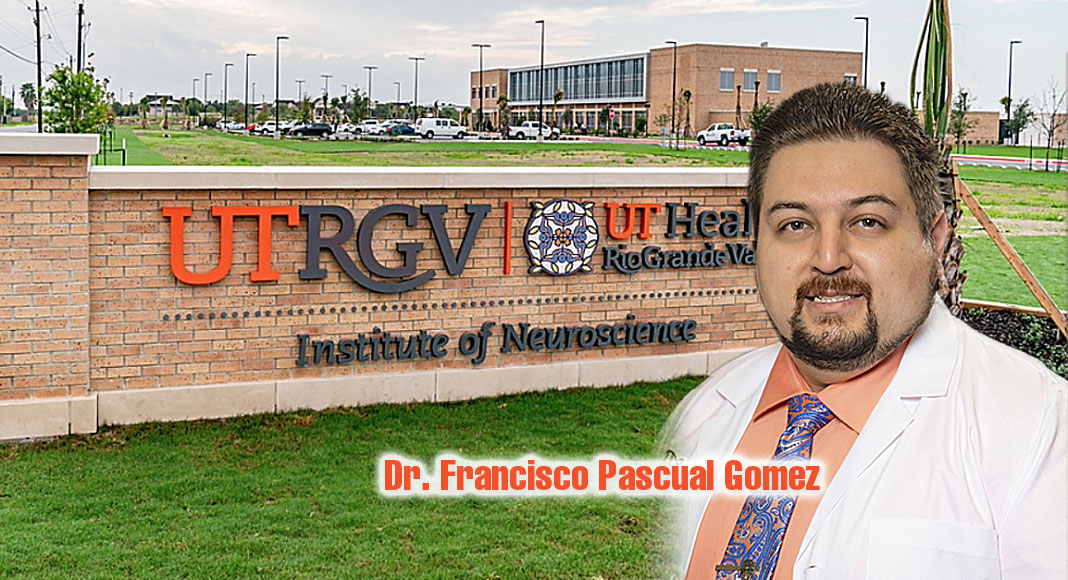
Dr. Francisco Pascual Gomez, UT Health RGV neurologist. Gomez is one of just two specialists in the Valley focused on Multiple Sclerosis. (UTRGV Photo by Jennifer Galindo)
Mega Doctor News
By Saira Cabrera
RIO GRANDE VALLEY, Texas – March is Multiple Sclerosis Awareness Month, so to bring awareness to the neuroinflammatory disorder, UT Health RGV neurologist Dr. Francisco Pascual Gomez will discuss MS and efforts to provide services for the Valley and beyond.
Gomez, a multiple sclerosis specialist, assistant professor of Neurology, and Neurology clerkship director at the UTRGV School of Medicine, is one of just two specialists in the Valley focused on MS.
MS is a disorder of the central nervous system in which the immune system damages myelin, the protective covering of nerves.
“In basic terms, multiple sclerosis causes inflammation in the brain or spinal cord, even in the optic nerves,” Gomez said. “That inflammation causes damage and leads to disability if not treated early.”
There are more than 2.3 million people diagnosed with MS worldwide today.
MS IN YOUNG ADULTS
Most often, it is younger adults who tend to be diagnosed with the disease.
“Some of the things we see with multiple sclerosis is that it affects younger people,” Gomez said. “These younger patients tend to be in their early 20s and into their 40s.”
Women are more likely to get MS than men, he said, “at almost a three-to-one ratio. “But it tends to affect men more severely than women if they get it.”
It is crucial for younger people to be aware of their symptoms, he said, and to work with their primary care provider or neurologist, to have the best quality of life possible.
POSSIBLE SYMPTOMS
Gomez said there are some key signs to look out for.
- Blurred vision to the point that one eye does not see the same as the other.
- Loss of vision in one eye, even if transient (meaning it comes and goes in a matter of hours to days).
- Problems with balance. As you walk, if you stumble and don’t know where your foot is going.
- Vertigo in younger people that lasts hours or more.
- Problems holding your bladder.
- Weakness, numbness, or tingling that doesn’t quite fit a pattern – for example, numbness in one arm and weakness or numbness in the opposite leg.
“Many MS symptoms can be mimicked by other conditions, especially in an older patient, but those are things that you should look for,” Gomez said. “If you notice these symptoms, you should go to your primary care doctor to be referred to a neurologist. This is not an easy disease to diagnose, and misdiagnosis is common.”
CARE CLOSE TO HOME
Because MS is a rare neurological disorder, it is even rarer for Valley communities to have “close to home” medical services to diagnose and treat it.
“There are just not enough neurologists in the Valley for the patients who need care,” Gomez said. “So, at UTRGV, we are trying to bridge that gap in care. And that goes for all neurologic disorders.”
Before the UTRGV Institute of Neuroscience in Harlingen (ION) existed, neurological patients had to travel outside of the Valley to find treatment for MS and its symptoms.
Today, Gomez said, he and other UT Health RGV neurologists and medical staff are available at ION to help manage MS symptoms and improve a patient’s quality of life.
“In just a short amount of time, the treatment choices for MS have expanded and continue to expand,” Gomez said. “Our goal at ION is to bring that care close to home, centered all in one place.”
Dr. Michael B. Hocker, dean of the UTRGV School of Medicine and senior vice president for UT Health RGV, said one of the School of Medicine’s priorities is to bring specialists and top researchers to the community, like Gomez and the rest of ION’s faculty and staff.
“We have great people here with a passion for serving the needs of our communities,” Hocker said. “Together, we will continue to transform the health of the Rio Grande Valley. It is exciting to know that we will continue to develop life-changing research at UTRGV and the School of Medicine, and that those discoveries will potentially get us closer to finding a cure for MS and other neurological disorders.”









